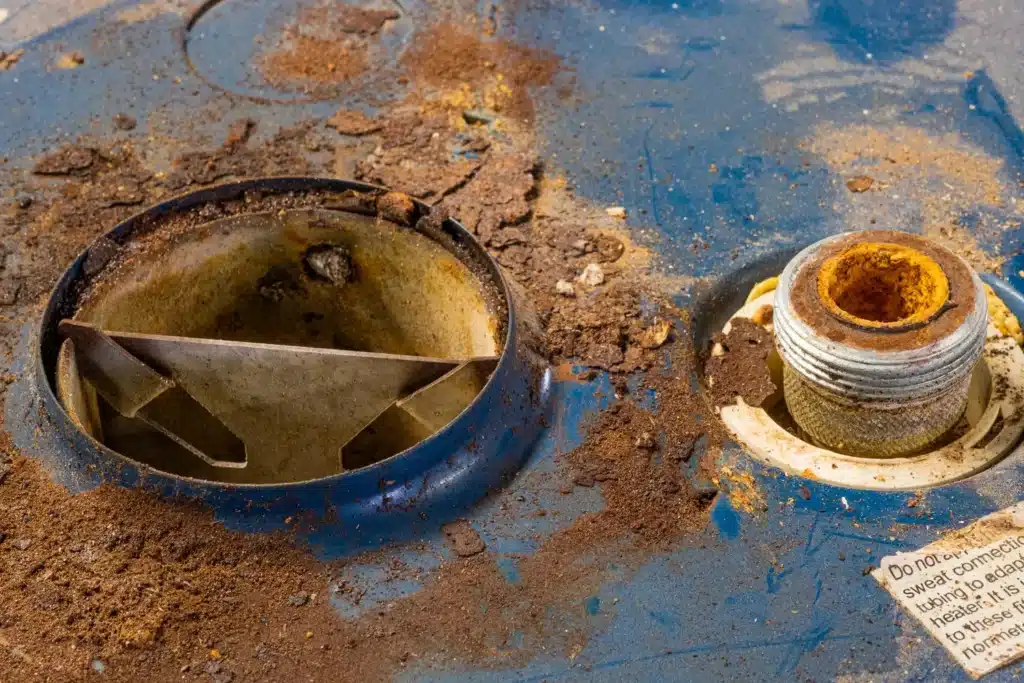
As an essential appliance, your water heater works hard to deliver hot water on demand. However, behind its unassuming exterior is the potential for explosive disaster. Faulty parts, sediment build-up, and improper maintenance can create a deadly combination of excessive pressure and heat. This leads many homeowners to wonder if their water heater could explode, even when turned off.
In this article, we’ll clarify warning signs like sounds, water conditions, and other damaged parts that could be indicators of an accident waiting to happen. We’ll also cover whether turning off the water heater can help counteract these issues, and the best steps you can take to ensure complete home safety.
Why Water Heaters Explode
In general, water heaters operate under high pressure. Sediment buildup, faulty parts, or improper temperature settings can cause the tank to overheat. This rapid increase in heat and pressure can lead to an explosion.

Can Turning Off the Water Heater Prevent an Explosion?
Simply turning off the water heater will not cause it to explode. In fact, an explosion is more likely to occur when the appliance is turned on and functioning.
However, turning off the unit can temporarily reduce risk while addressing potential underlying issues. Routine maintenance and inspection of all components is key for ongoing safety.
Warning Signs Your Water Heater May be in Danger
When in doubt, listen and look for these signs that your water heater may be at risk of exploding:
- Loud banging, rumbling, or popping sounds
- Rusty/discolored water from faucets
- Foul odors coming from the unit
- Leaking water around the base
- Dripping pressure relief valve
5 Tips to Prevent Water Heater Explosions
- Flush the tank and inspect parts annually. Remove sediment and replace worn components.
- Set temperature below 120°F. Excessive heat builds pressure.
- Install a pressure relief valve rated for your water heater’s BTUs.
- Replace rusty/leaking parts immediately, including valves, pipes, and fittings.
- For gas units, check connections for leaks annually and after earthquakes or major impacts.

Other Recommended Maintenance
To keep your water heater operating safely and efficiently for years to come, make sure to follow all manufacturer-recommended maintenance. This includes periodically flushing out the tank to remove sediment buildup. Sediment can corrode the tank from the inside and also reduce heating efficiency.
Also, check that temperature and pressure levels are calibrated correctly. Set the temperature no higher than 120°F to avoid excessive pressure buildup. Test the water heater’s pressure relief valve by manually opening it to ensure it is operating properly. This valve is a crucial safety component that allows excess pressure to be released.
For gas water heaters, examine the gas line and connections leading to the appliance annually. Check for any leaks, which can be a major explosion risk. Turn off the gas supply and repair any leaks before using the water heater, and inspect after any major impacts that could have damaged gas connections.
When to Call a Professional
While the maintenance tips provided can help you prevent disasters, it’s important to know when to bring in a professional. Water heaters require expertise to install, repair, and replace. Contact a qualified technician if you notice any of the warning signs outlined above. Strange sounds, leaks, and odd smells indicate it’s time for an expert assessment. Additionally, call for assistance if:
- The tank is over 10 years old, as replacements may be needed due to lifespan.
- You are unsure of how to properly perform any maintenance tasks. Improper maintenance can cause further damage.
- Major adjustments like gas line repairs, valve replacements, and sediment flushing are needed. Only make alterations you’re qualified for.
Conclusion
Your water heater provides an essential service – while it’s less likely to explode while turned off, it requires proper maintenance and care. Listen and look for signs of potential failure with routine upkeep and quickly address any concerns. To get expert eyes on an existing issue or schedule an inspection to prevent problems later on, reach out to All Coast Home Inspections in Houston, TX, and surrounding areas.


